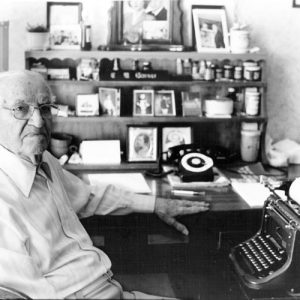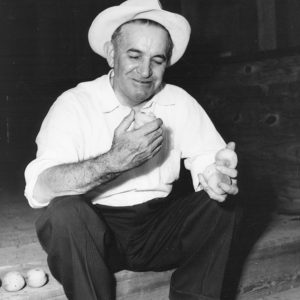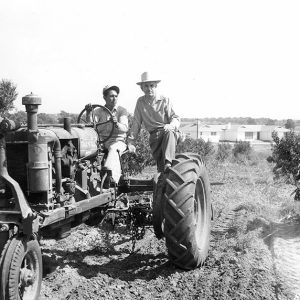calsfoundation@cals.org
Claud Wilton Garner (1891–1978)
Claud Wilton Garner was a man of many interests and talents. He began as a musician, became a merchant and an advocate for farmers, and, when he was fifty years old, began writing fiction. In addition to his interest in writing, he also composed a number of pieces of music. The sheet music for these compositions, along with the recordings, are located in the Southwest Arkansas Regional Archives in Washington (Hempstead County). Garner is remembered both as an Arkansas author and as a worker for farmers in Southwest Arkansas and in the Rio Grande Valley.
Claud Garner was born in Hope (Hempstead County) on August 29, 1891, to Thomas Jefferson Garner and Ida Hope Haynes Garner. He had three sisters and one brother. When Garner was a young man, his father owned and operated a mercantile store in Washington. His mother ran a hotel in Nashville (Howard County).
Garner graduated from Hope High School at the age of fifteen and, in 1906, enrolled at Ouachita College (now Ouachita Baptist University) in Arkadelphia (Clark County), the school his mother, one of his sisters, and his brother attended. While at Ouachita, Garner was known for having a fine baritone voice. The summer after his freshman year, Garner took a job singing for a movie house. The movies were silent, and having someone sing or play during the movie was a common practice of the day. The following fall, he did not return to Ouachita for his sophomore year. Instead, he joined the traveling Jack Raymon Tent Show, which took him to towns in Arkansas, Louisiana, and Mississippi. The Jack Raymon Tent Show was patterned after the popular vaudeville shows of the day. The show usually involved singing and dancing, and Garner’s baritone voice made him a fine addition to the troupe. In Mississippi, he met and married Geraldine Blackmore in 1907, and they settled in Summit, Mississippi, near McComb.
Because the money earned from the tent show was not enough for him and his new wife to live on and Garner felt attached to the area of southwest Arkansas, the couple returned to Washington to work in his father’s mercantile store.
In 1916, while working at the store in Washington, Garner was instrumental in organizing a farmers’ cooperative, the purpose of which was to ship cantaloupes and watermelons from farms in Hempstead and Howard counties in southwest Arkansas by rail to northern cities. During the next two years, he was able to secure better markets for the growers in the area, and the farmers, as a group, had more negotiating power. As a result, in 1918, the American Fruit Growers Association offered him a job as a field man for their organization in the Rio Grande Valley in Texas.
Garner and his wife divorced in 1930, and in 1935, he married Ruth Stuart Robison and became the manager of a fruit-packing plant in McAllen, Texas. During the next twelve years, he became part owner of a 1,600-acre orchard in the Rio Grande Valley. During that time, he was busy with his investments, but he kept a daily journal and both observed and interviewed the many Mexicans who worked in the region. He discovered that a number of the workers were illegal aliens, and he became increasingly interested in their lives in America.
An avid hunter, Garner met a fellow hunter, a man who told him the story of how he had been an alien worker who had worked to become a successful rancher. Garner used that friendship as the basis for his first novel, Wetback, the rags-to-riches story of Dionisio Jesus Molina. The novel, published in 1947 when Garner was fifty years old, sold 20,000 copies and won the Texas Institute of Letters Award in the same year.
With a successful first novel, Garner turned to his hometown of Washington for the setting for his next novel, Cornbread Aristocrat. It too was a rags-to-riches story of a young “river rat,” Toby Giles, from the Tidewater area of Virginia who migrated to Arkansas with a wagon train and settled in Washington. Giles began his journey in poverty, and with the use of his winsome personality, ambition, and some shady dealings, began his journey to capture the American Dream. The novel was published first in hardback by Creative Age Press of New York in 1950 and in 1952 as a Signet paperback.
Garner’s next two novels were The Young Texans (1960) and Word of Honor (1964), both of which continued that Horatio Alger theme of moving from poverty to wealth. His last book, Sam Houston: Texas Giant, was published in 1969. While doing research for Cornbread Aristocrat, Garner had become interested in the accounts of Sam Houston, Albert Pike, and Jim Bowie. He was particularly interested in their connection to Washington. That interest led him to read several biographies about Sam Houston, and his book was an attempt to balance the two extremes already presented in these biographies, namely that Houston was either a great hero or a misguided romantic.
Garner’s wife died in 1973, and shortly afterwards, he returned to Hope, where he lived until he suffered a stroke and died on July 6, 1978. He is buried in the Hope Memorial Gardens.
For additional information:
Claud Garner Papers. Southwest Arkansas Regional Archives, Washington, Arkansas.
Tom Greer
Ouachita Baptist University
 Claud Garner
Claud Garner  Claud Garner
Claud Garner  Claud Garner
Claud Garner 




Comments
No comments on this entry yet.